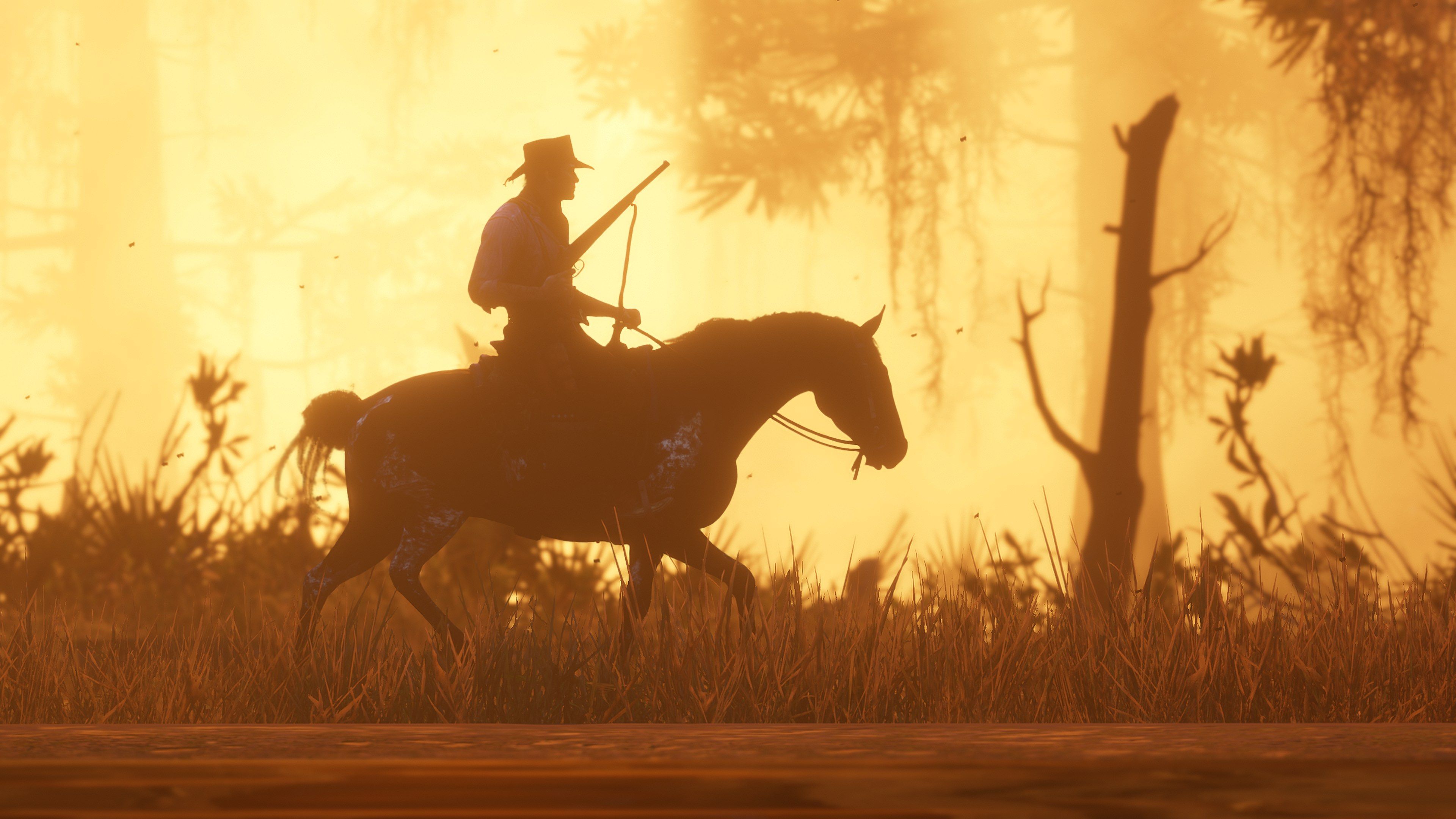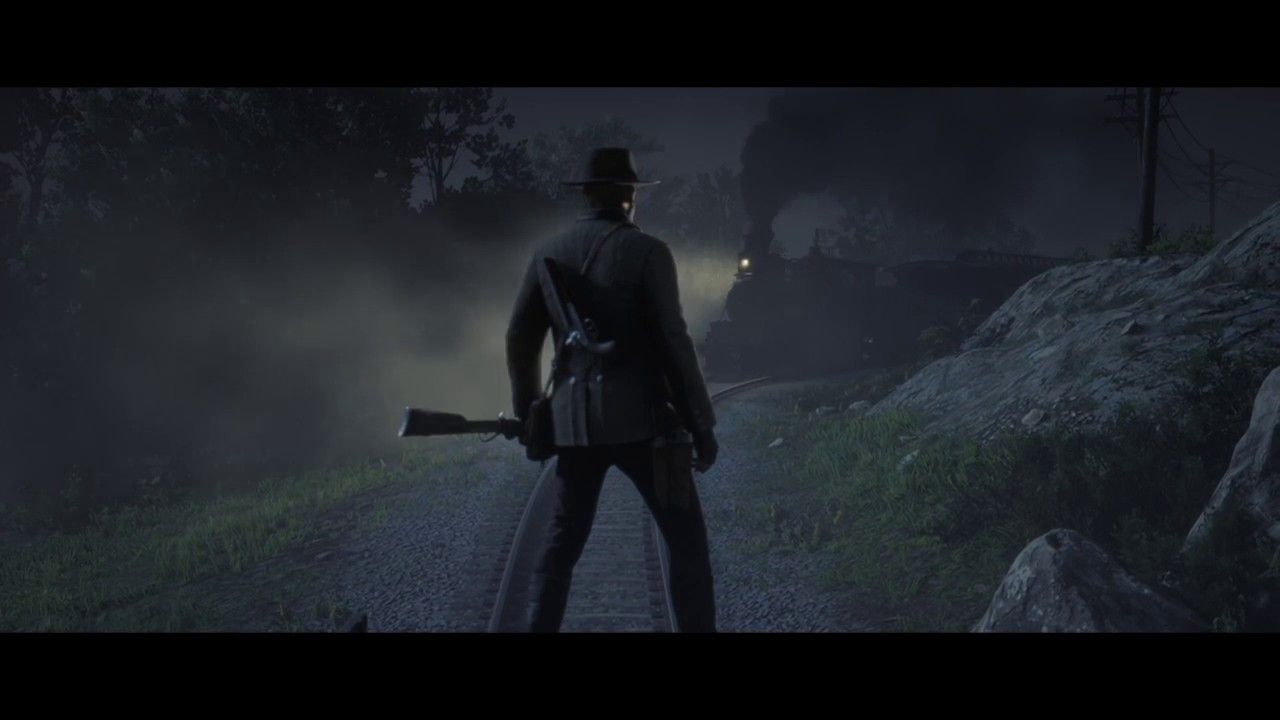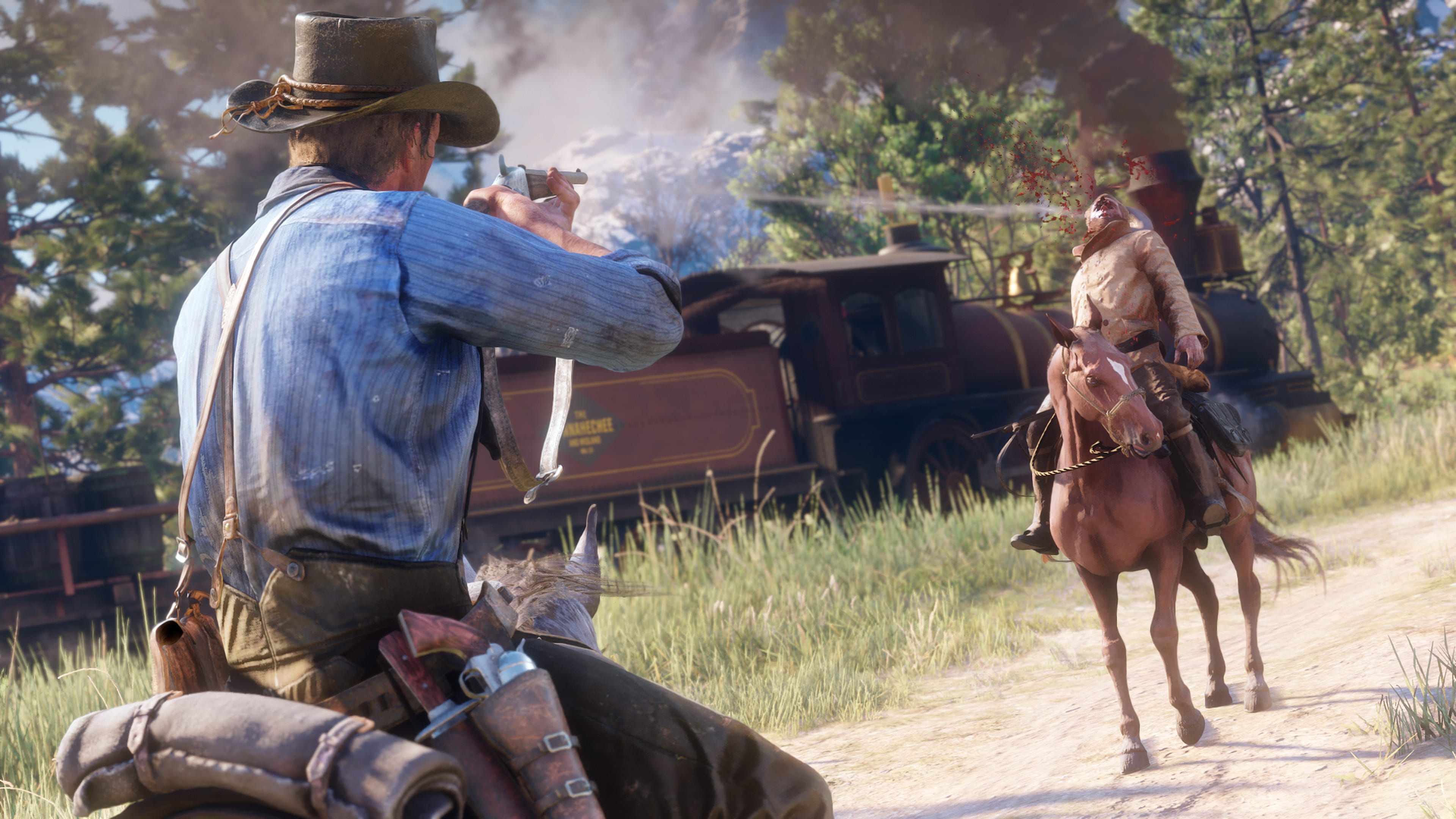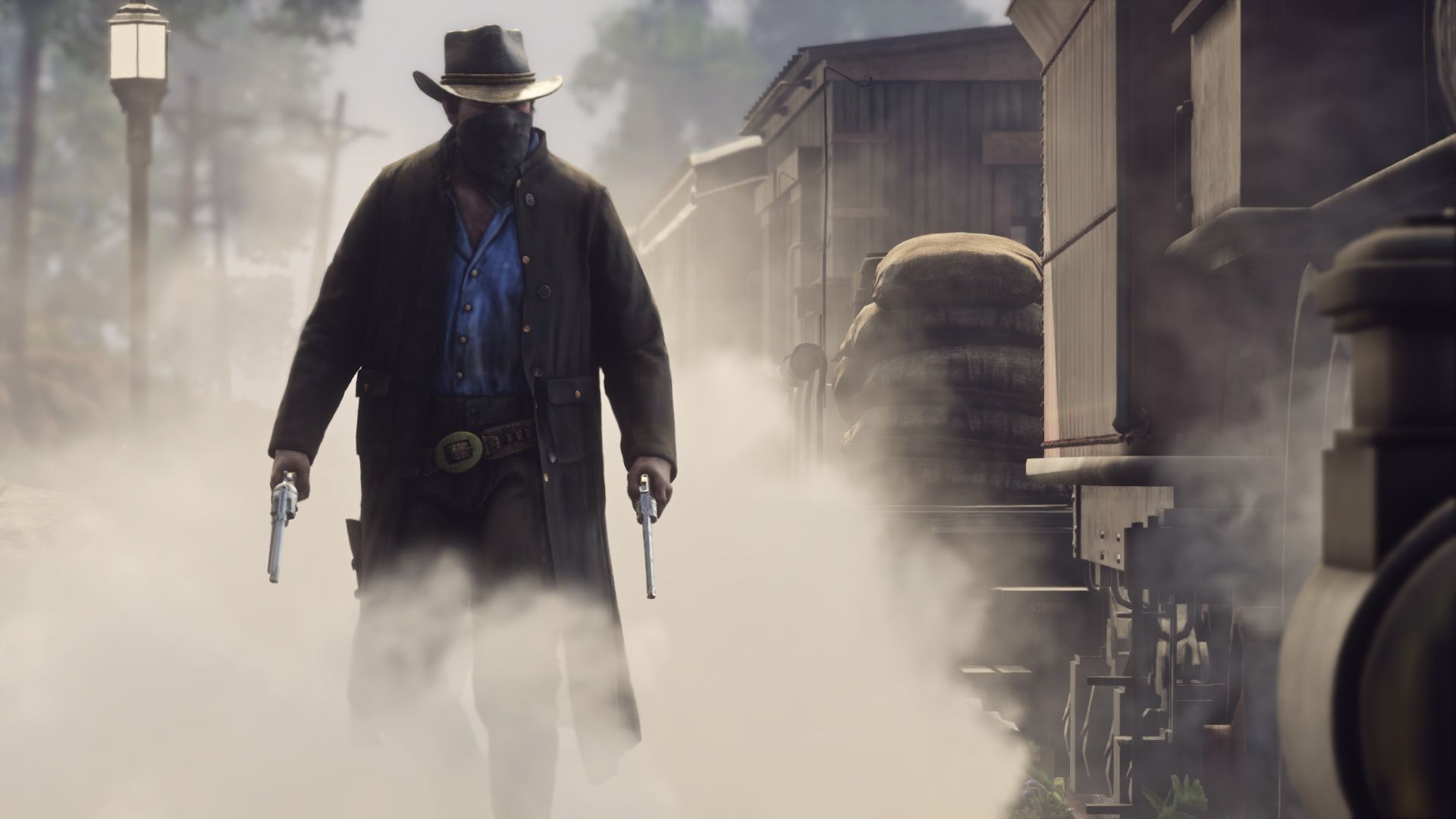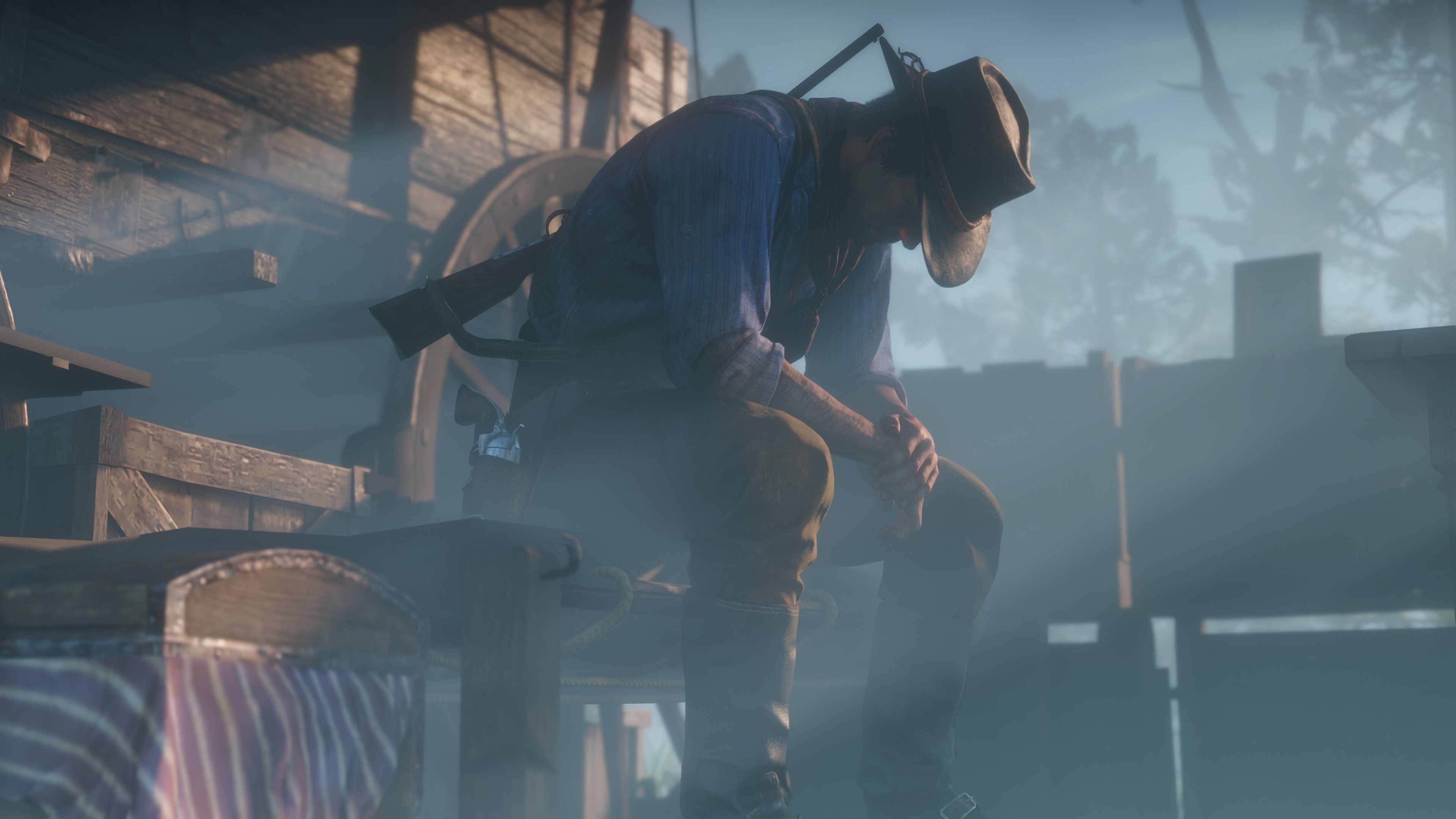Every time the black bars letterboxed the screen during Red Dead Redemption 2, I knew that the "video game" portion of this experience was on hold. I couldn't help but feel frustrated that Rockstar (and the game's writers) were plopping a movie in front of me instead. It is relatively obvious that Rockstar's recent games are meant to invoke the feelings of familiar films, but reading and hearing the thoughts from my peers had me realize that many of us—the Housers included—simply have it wrong when analyzing this game's relationship with the Western film genre.
As someone who studied film in high school and college, I probably have seen a few more Western films than I had wanted to. While I was never fond of the genre and the stories and themes it presented, I found myself more fascinated with the resurgence of the genre rather than the oversaturated Spaghetti Western era of yore. I suspect that Dan Houser was as well because Red Dead Redemption 2 did not remind me of Spaghetti Westerns. In the place of dramatic stand-offs, wandering "men with no names," and black-and-white morality, there was a grey sense of morality and more profound cynicism at the heart of Red Dead Redemption 2.
Even with this context in my head as I progressed through the game, I had a feeling that Red Dead Redemption 2 missed its mark when it came to storytelling, even as it kept congratulating itself.
[pullquote]"Thematically, both Red Dead Redemption 2 and The Assassination of Jesse James focus on a commune of criminals and gang members, led by a charismatic leader who the rest of the gang eventually become disillusioned with." [/pullquote]
I kept thinking back to Andrew Dominik's 2007 film The Assassination of Jesse James by the Coward Robert Ford, which I've been presuming was the most prominent visual inspiration for Red Dead Redemption 2 for a few reasons. For the most overt example, look no further than the major train robbery sequence from early on in the story, and compare it to one of the first scenes in Dominik's film. From the foreboding music, the light in-between the trees as the gang members await the train, and the point man standing on the track to stop the train, the two scenes are nearly the same beat-by-beat.
The visual connections stack up when you compare transition scenes with Arthur Morgan having a blurry, dream-like quality that resembles the film's cinematography from Roger Deakins. Thematically, both Red Dead Redemption 2 and The Assassination of Jesse James focus on a commune of criminals and gang members, led by a charismatic leader who the rest of the gang eventually become disillusioned with. There's even the same devotion to realism—Dominik's film attempts to be as authentic in portraying events, dialogue, and action the same way it would happen, with shootouts happening at point blank range with both combatants missing each other. It's slow, deliberate, and honestly, a bit boring—which is how I felt about Rockstar's game every time I was told to search a room.
Of course, all media finds its inspirations from what came before—just look at all of the "Westerns" that Quentin Tarantino has done in the past few years, such as Django Unchained and The Hateful Eight. Interestingly enough, some of the other staff of DualShockers found the harsh winter of the game's first chapter to be reminiscent of The Hateful Eight. But usually, that inspiration and reuse of imagery have to go further than "the director thought this looked pretty." With that, I remained confused about exactly what head writer Dan Houser was going for with Red Dead Redemption 2, other than proving that he has a lot of thoughts about American society (as he previously demonstrated in Grand Theft Auto V, a game that felt like a sequel to Goodfellas from some alternate timeline) and that yes, he has indeed seen a lot of movies.
This leaves the feeling that Red Dead Redemption 2 is stuck in limbo: it tells a story in the style of a modern, revisionist neo-Western, while yearning for the old Western.
[pullquote]"Red Dead Redemption 2 is stuck in limbo: it tells a story in the style of a modern, revisionist neo-Western, while yearning for the old Western."[/pullquote]
It is quite surprising to me that any artist would attempt to make a new Western in the age of HBO's Westworld. In that show by Jonathan Nolan and Lisa Joy, historical periods such as the Old West, feudal Japan, and colonial India are distilled to technologically-advanced theme parks, where the rich and privileged can enjoy endless leisure and can live out their apparent fantasies with acts of violence and debauchery. One can almost say that the development of Red Dead Redemption 2 and the scenario presented in Westworld are analogous in those regards.
But that wouldn't go with Dutch Van der Linde's positions against industrialization, modernization, and technology. Dutch, who I couldn't help but see and hear as a more handsome Matt Foley from SNL, finds a rival in Leviticus Cornwall, a captain of industry and one of the many banes of Dutch's existence. He may as well have ended every encounter him by shaking his fist at the sky and screaming "Cornwall!" in anguish. Using Cornwall as a target, Dutch fashions himself as a man of the people, wanting to go back to a time before "law and order" and attempting to score cred by helping some local angry indigenous folks. As Arthur Morgan discovers later, this is all part of Dutch's plan to exploit this tribe's conflict with the U.S. Army for his own gain.
On a similar note, Red Dead Redemption 2 fails to engage with bad actors in this period properly. While the ideals of Cornwall and the Pinkertons are destructive and villainous in their own ways, the game romanticizes the Western lifestyle and ignores that lifestyle's part in the intense hardships of indigenous people at that period. While this game doesn't go the Spaghetti Western route in completely ignoring sensitive issues, it bungles its attempts to be more modern and self-aware, while falling into old, "classic" narrative tropes with the Rains Fall story arc. In a moment when the game attempts (with bare minimum effort) to make some form of commentary involving a group of Ku Klux Klan members accidentally catching themselves on fire, the scene doesn't register in a satisfying way. It's the equivalent of depicting Adolf Hitler slipping on a banana—a farce with nothing substantial to say, while trying to make it seem like a statement.
[pullquote]"While Red Dead Redemption 2 doesn't go the Spaghetti Western route in completely ignoring sensitive issues, it bungles its attempts to be more modern and self-aware."[/pullquote]
I consistently struggled in trying to figure out just what Dan Houser and his co-writers were trying to convey throughout the story in Red Dead Redemption 2. Whenever it appeared that some allegory was being set up, the scenarios would delve into quirkiness and involve stereotyped characters. Without detailing each one, I played three particular Stranger missions that put me off with that exact formula: the ones involving the characters of Margaret, Bertram, and the pair of Mr. Black and Mr. White. This video game, which is presented with the themes of modern Western stories, comes across more like a subpar attempt at subversion. Houser perhaps wants to satirize the caricatures of old Westerns, but ends up creating caricatures of his own. But hey, this is also coming from the same train of thought that replacing "Metlife" with "Getalife" in Grand Theft Auto IV was brilliant satire.
The only element that I could track consistently was this feeling of disdain from the characters. Even with the game's 1899 setting, I kept thinking back to the contemporary Western Hell or High Water by director David Mackenzie and writer Taylor Sheridan, who is also responsible for Wind River and the Sicario films. To sum up the film's themes, it was implicitly about the "silent majority" that became disillusioned with the rest of the nation's move towards progressivism. It's a cops-and-robbers film in rural America, where ordinary people rob banks out of financial desperation, citizens openly carry firearms, waitresses complain about city folk and their values, and indigenous people are pushed around and bullied by their peers.
I kept imagining that this was the type of story that Houser wanted to tell, and while Hell or High Water might have its own set of problems, it never needed to reduce anything to caricature the same way that Red Dead Redemption 2 does. This is a game that tries to desperately to show its maturity, that it's past the simple morals of fantastical and escapist gunslinger movies, and more along the lines of a "prestige" film like those of Sheridan or Dominik. Yet somehow, old Houser habits have a stubborn refusal to die, creating a product that is in odds with itself.
[pullquote]"This is a game that tries to desperately to show its maturity, that it's past the simple morals of fantastical and escapist gunslinger movies, and more along the lines of a "prestige" film."[/pullquote]
The thematic discrepancies of this game couldn't be more evident to me every time that goddamn deer showed up in Arthur Morgan's dreams. These are brief sequences that felt like a fetishization of the frontier—they recall not just nostalgia for the Old West, but for the first Red Dead Redemption game, with the basic melody of the theme playing in the background. It can be debated for hours what the English-class level metaphor that the deer is meant to represent, but I had this feeling that by showing us Arthur trying to remember the "glory" of the West, the game is trying to invoke the same feeling in the player. Think of the way that Kingsman: The Secret Service attempted to argue in favor of bringing back the camp and irony of old spy films, which undid its own argument when the movie ended with an homage to sex scenes of James Bond films past, reminding viewers of how problematic that era was.
At this point, Red Dead Redemption 2 feels like a video game attempting to tell a story with modern sensibilities about trying to keep the past alive. There is a fear from the characters that their way of life will be eradicated, and similarly, some creative forces behind this game could very well be afraid that their opportunity to tell a story in this genre is under danger. Like Dutch himself, Red Dead Redemption 2 is afraid of being forgotten and irrelevant and fights to justify the existence of its story and characters.
I always question what the role of the Western genre, with all of its baggage, can be in this day and age. Regardless of the answer, so many parts of Red Dead Redemption 2's story felt like a pale imitation of more celebrated examples of the genre. If it hasn't come already, there will come a time where this modern tale will have been told too many times. What will result is an irony where media is overstuffed with Westerns arguing that the Western shouldn't die out.
[pullquote]"The experience of playing through Red Dead Redemption 2's collage of the misunderstood is one that makes the Western a genre that I will want to take the longest break from."[/pullquote]
Red Dead Redemption 2 is a graphical and visual achievement for sure, but every "exceptional" story element is merely surface level. By the end of it all, the game feels like a package designed for the mainstream media for some futile campaign proving that games are movies now; a movement that personally seems like it comes more from self-insecurity than from true reverence for the medium. By attempting to signal a movement forward for video games, I feel that in certain ways, this game has moved the form backward.
I can't imagine what an inevitable Red Dead Redemption 3 would even be about. If the first game was about the death of the West and the second about how the West died, would a third go further back in the timeline in the early days of Dutch's gang to depict a time of the West... close to dying? Perhaps Rockstar will try to go contemporary, maybe attempting to remake Hell or High Water about ten years too late. Regardless of what any of these plans may be, the experience of playing through Red Dead Redemption 2's collage of the misunderstood is one that makes the Western a genre that I will want to take the most extended break from.

